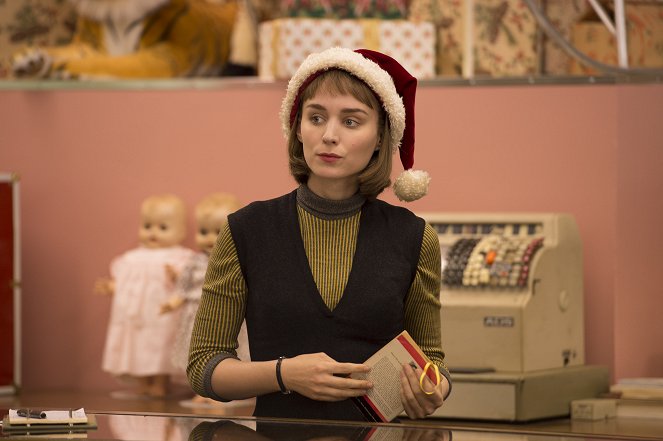Director:
Todd HaynesGuión:
Phyllis NagyCámara:
Edward LachmanMúsica:
Carter BurwellReparto:
Cate Blanchett, Rooney Mara, Kyle Chandler, Jake Lacy, Sarah Paulson, Cory Michael Smith, Carrie Brownstein, John Magaro, Ken Strunk (más)Sinopsis(1)
Carol se centra en la relación de dos mujeres muy diferentes en la década de 1950 en Nueva York. Una joven de 20 años, Teresa (Mara), trabaja en una tienda y sueña con una vida más plena cuando conoce a Carol (Blanchett), una seductora mujer atrapada en un matrimonio adinerado, pero sin amor. A medida que la historia se desarrolla, sus vidas empiezan a desmoronarse mostrando a Carol cada vez más temerosa de perder la custodia de su hija en caso de una separación, cuando su esposo (Chandler) cuestiona su capacidad como madre al descubrir la relación que sostenía con su mejor amiga, Abby (Paulson). (Vértigo Films Esp.)
(más)Videos (29)
Reseñas (7)
Desafío cinematográfico en cuarentena - actrices favoritas, Rooney Mara. Inconscientemente, dentro de mi desafío, creé un duelo de hermanas Kate Mara vs. Rooney Mara en películas con temática lésbica. Y claramente gana Kate Mara. Rooney, aunque actúa excepcionalmente bien en Carol, la película tiende a ser demasiado lenta, prolija y aburrida. Algunas tomas largas tienen su significado y crean la atmósfera correcta, pero a veces la película se ahoga en lo innecesario. Además de Rooney, Cate Blanchett también actúa brillantemente, su papel es más que preciso.
()
Hermosa cámara y música. Pero la historia de la pareja central es terriblemente SOSA psicológica y sexualmente. Al igual que ver la puesta de sol a través de un plástico perfectamente pulido. Verla sentado en el duro asiento de madera de la Casa Municipal (inauguración del festival de cine) fue un sufrimiento.
()
Carol is a movie that’s based solely on the acting performances of Cate Blanchett and Rooney Mara. They both act exactly the way they need to. Cate is beautiful, dominant and exactly knows what she wants. Rooney is beautiful, quiet and her there’s a battle going on in her heart. But if it weren’t for one faint mention of the Czech Republic, there wouldn’t really be any significant reason for me to listen to the dialogues.
()
Strong acting, masterfully directed and written, but for me it falls into the category of predictable queer drama with everything that it encompasses, including very stenciled emotions. A model American melodrama that deservedly receives acting awards, but at the same time a film that ends only with realization bravado. Cold, forgetful, over-cultivated - at least that's how it felt to me during this year's Cannes competition.
()
In terms of style, Carol is perhaps Todd Haynes’s "straightest" film. Far From Heaven was rather more a meta-commentary on Douglas Sirk’s melodramas than a pure, absorbing and universal love story. In my opinion, Carol is a mature work by a director with a sense of humility toward both the story the and actresses depicting who doesn’t need to prove anything to himself or the audience (yes, I’m looking at you, Alejandro). With its purifying simplicity, behind which you feel the long consideration put into every shot, it reminded me of Lean’s Brief Encounter. In Carol, we also begin with one of the last scenes (which we see from a completely different perspective at the end), the points of view of the two lovers are also taken into equal consideration and their love is of the forbidden, socially unacceptable kind. However, the protagonists have to hide their emotions even more cautiously than the lovers in Lean’s film. Their relationship is perceived as obscene not only morally, but also legally, which enriches the narrative with the elements of a crime story. Therese and Carol must limit their interactions to fleeting touches, timid glances into each other’s eyes and outwardly innocent conversation. Their position in the shot, the settings in which they find themselves, the objects that complement them (or prevent us from seeing them better) often reveal more to us. This is probably why many find the film academically cold and detached. I would rather choose the words “subtle” and “restrained” – the film is not built on grand emotions and contrived plot twists, but on the small gestures and glances through which Carol and Therese communicate with each other, for lack of any other vocabulary, to the point where they can no longer return to their previous identities and no longer pretend to be someone else. Thanks to what is felt but not expressed, the film does not lack a dramatic or erotic tension, which would be unattainable with greater explicitness. In the search for relationship balance, Haynes meaningfully combines several minor motifs (the car ride, a symbol of the protagonists’ enclosed microcosm and their unfulfilled desire for freedom, security and gaining power over perspective and representation through photography) and supporting characters, not one of which ultimately gives Carol and Therese an excuse to verbalise their feelings. Like The Duke of Burgundy, Carol is not only about a lesbian relationship. Probably everyone who has ever been in love has experienced the same uncertainty about how to express feelings for which they don’t have words. 85%
()



Anuncio